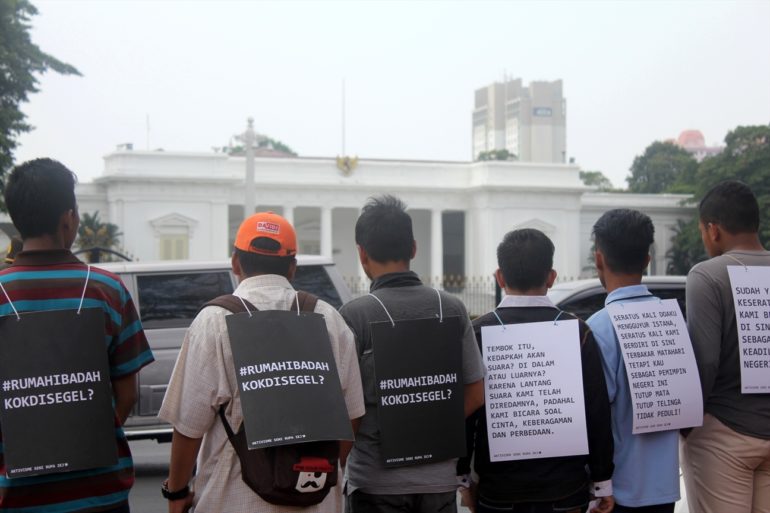
Indonesia saw fewer violations of religious freedom in 2017 than the year before, a national human rights group said this week, although it said it remained concerned about “the politicisation of religious and social differences”.
In its ‘2017 Report on Religious Freedom and Religious Minorities in Indonesia’, the Setara Institute said state actors (government, police, educational institutions) were responsible for 75 violations (140 in 2016), while 126 were caused by individuals or groups.
Chief among offending groups were hardline Islamic groups such as the Indonesian Ulema Council and Islamic Defenders Front. West Java, the province where these groups are particularly influential, recorded the most violent incidents (29).
“Most of the violations were directed at minority religious groups including Christians, Confucians, Buddhists, Hindus and Shiites, with incidents including intimidation, discrimination, assault, hate speech, bans on worship and the sealing of houses of worship”.
‘Developing respect’
The second-highest number of violations took place in the Indonesia’s capital, Jakarta (26). The city was ranked the “least tolerant city in Indonesia (worse even than Banda Aceh)” by the institute last year.
The blasphemy trial of Jakarta’s former governor, Basuki Tjahaja Purnama (better known as “Ahok”), a Christian and ethnic Chinese, was reported internationally in 2016 and 2017. His trial was characterised by mass demonstrations, with repeated clashes between his supporters and radical Islamic groups, challenging religious pluralism in the Muslim-majority country.
Setara said the figures showed that Indonesia still has some way to go with “developing” respect for religious freedom as a human right, as well as “fair and strict law enforcement”, as reported by the Jakarta Globe.
The regional elections in June and general elections in 2019 will be a test case, according to Setara, as they “may see the politicisation of religious and social differences”. At a rally in December the Islamic Defenders Front called on Indonesians to vote only for Muslim candidates in both elections.
‘Situation deteriorated’
On the most recent Open Doors World Watch List of the 50 countries where it is most difficult to live as a Christian, Indonesia rose from 46th position last year to 38th.
“The situation for Christians has deteriorated in the course of recent years”, Open Doors said.
The charity said “non-traditional church groups experience difficulties getting permission for building churches”, while Catholic churches have reported similar challenges.
In a combined Christmas message in December, Indonesia’s Catholic and Protestant bishops warned against division, saying “our unity as an Indonesian nation is in danger of breaking”.
The Economist reported earlier this month that over 1,000 churches were closed between 2006 and 2014, but that, despite this, Evangelical and Pentecostal churches are growing, with most of the growth coming from the ethnic Chinese population.